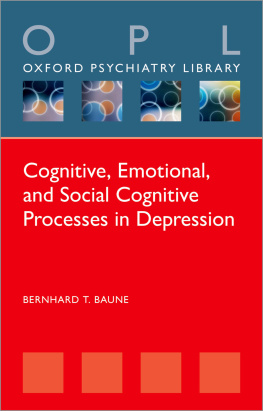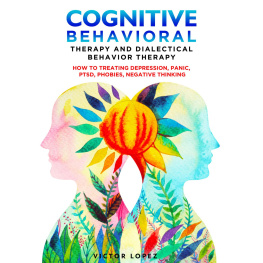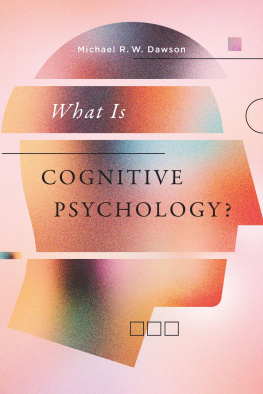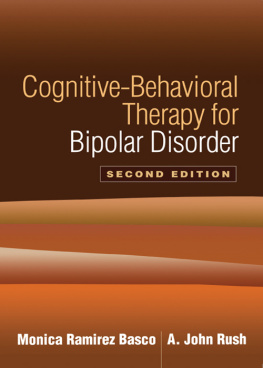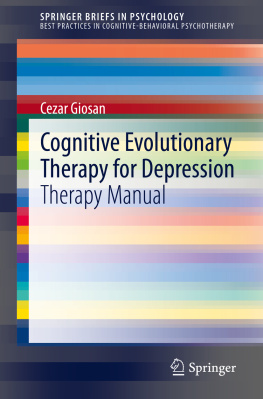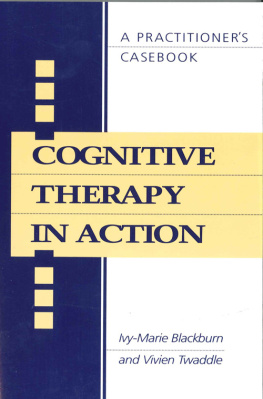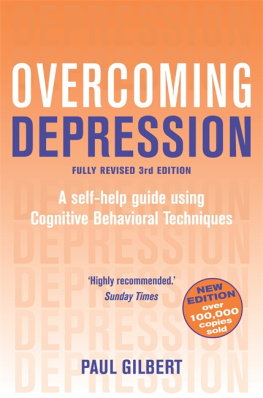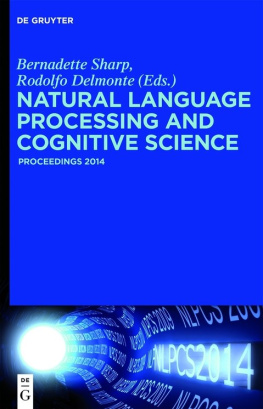O P L
OXFORD PSYCHIATRY LIBRARY
Cognitive Dimensions of Major Depressive Disorder

Great Clarendon Street, Oxford, OX2 6DP,
United Kingdom
Oxford University Press is a department of the University of Oxford.
It furthers the Universitys objective of excellence in research, scholarship, and education by publishing worldwide. Oxford is a registered trade mark of Oxford University Press in the UK and in certain other countries
Oxford University Press 2021
The moral rights of the author have been asserted
First Edition published in 2021
Impression: 1
All rights reserved. No part of this publication may be reproduced, stored in a retrieval system, or transmitted, in any form or by any means, without the prior permission in writing of Oxford University Press, or as expressly permitted by law, by licence or under terms agreed with the appropriate reprographics rights organization. Enquiries concerning reproduction outside the scope of the above should be sent to the Rights Department, Oxford University Press, at the address above
You must not circulate this work in any other form and you must impose this same condition on any acquirer
Published in the United States of America by Oxford University Press
198 Madison Avenue, New York, NY 10016, United States of America
British Library Cataloguing in Publication Data
Data available
Library of Congress Control Number: 2021940633
ISBN 9780198835554
eISBN 9780192572486
DOI: 10.1093/med/9780198835554.001.0001
Oxford University Press makes no representation, express or implied, that the drug dosages in this book are correct. Readers must therefore always check the product information and clinical procedures with the most up-to-date published product information and data sheets provided by the manufacturers and the most recent codes of conduct and safety regulations. The authors and the publishers do not accept responsibility or legal liability for any errors in the text or for the misuse or misapplication of material in this work. Except where otherwise stated, drug dosages and recommendations are for the non-pregnant adult who is not breast-feeding
Links to third party websites are provided by Oxford in good faith and for information only. Oxford disclaims any responsibility for the materials contained in any third party website referenced in this work.
Preface
Major depressive disorder (MDD) is a clinically and neurobiologically highly heterogenous mood disorder that consists of a variety of symptom clusters including mood symptoms, physical symptoms, and cognitive symptoms. While the traditional model of depression implicates mood as the primary symptom cluster, a more recently published conceptual understanding of depression has been extended to also include cognitive symptoms. Moreover, the understanding of the central role of cognitive processes in emotion processing, social interaction, and pure cognitive performance has led to a model that places cognitive processing central to the pathophysiology of depression.
Cognitive dimensions of depression have long been implicated in the nature of depression that is characterized typically by impaired cognitive and emotional processes. In the following volume the dimensions of cognitive function, emotion processing, and social cognitive processing are highlighted to comprehensively describe large parts of the clinical symptoms, as well as the pathophysiology and biology, of the brain-based disorder of depression. The focus on the cognitive and emotional dimensions of depression offers extended and novel diagnostic and treatment approaches ranging from pharmacological to psychological interventions targeting those dimensions of depression.
This volume will attempt to inform about some of the more fundamental psychological, biological, and clinical concepts that are applicable to the comprehensive treatment of depression. The volume is suitable for students, trainees, clinicians, and scientists in the fields of psychology, neuropsychology, psychiatry, cognitive neuroscience, neurology, general medicine/general practice, and other health care professionals as it will also cover core knowledge and skills for training as well as practice.
Bernhard T. Baune
Contents
Key points
Major depressive disorder (MDD) is characterized by severe and persistent cognitive symptoms.
Cognitive symptoms manifest across a broad range of cognitive domains.
Patients with MDD exhibit so-called cold and hot cognitive symptoms and show impaired social cognitive function.
Dimensions of emotional, nonemotional and social cognition impact psychosocial function and quality of life.
). Recent evidence suggests that cognitive dysfunction persists following symptomatic remission, highlighting the need to treat cognition separately from mood symptoms. Residual cognitive deficits may contribute to ongoing occupational and social dysfunction and promote suicide ideation. In addition, retention of cognitive impairment may interact with existing emotional and social vulnerability, increasing the risk of recurrent depressive episodes.
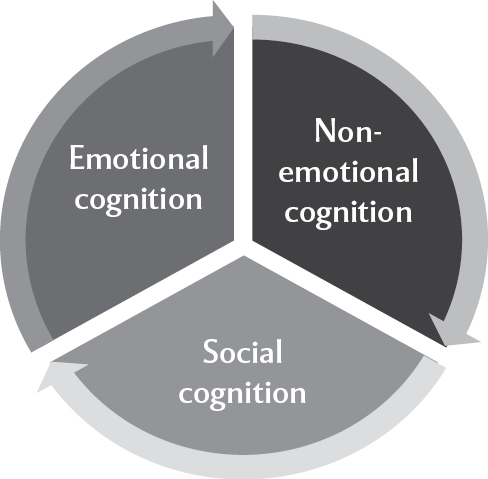
Figure 1.1 Domains of emotional, nonemotional, and social cognitive function
Domains of cognitive impairment in major depressive disorder
Current reviews suggest broad cognitive deficits in MDD, which are associated with impaired daily and psychosocial functioning. However, there is no firm consensus regarding which domains of cognition are selectively affected by depression, and hence which domains should be primary treatment targets. This uncertainty is caused in part by varied patterns of comorbidity and individual differences which affect cognitive functioning. However, ambiguous terminology and conceptual understanding of cognitive domains also contribute to uncertainty regarding cognitive deficitsan issue identified by authors who face difficulty in comparing cognitive functioning between studies.
Recent literature has identified impairment across several executive domains, including set shifting, inhibition, working memory, and verbal processing. Models of cognition and MDD underscore the vital importance of executive functioning in daily life and psychosocial abilities, suggesting that executive impairment may be a primary barrier to functional recovery in individuals with MDD. Although the domain-specific nature of executive impairment remains to be drawn out, current work supports the notion that executive remediation should be a primary target of cognitive treatment. Verbal processing, attention, learning, and memory also appear to be impaired by MDD. Given the importance of verbal memory and attention in occupational and social settings, it stands to reason that impairment in these domains may disrupt psychosocial functioning. Recent reports of impaired visuospatial processing in MDD are not consistent. However, patients with psychotic symptoms typically demonstrate lower visuospatial skills than depressed patients without psychoses, highlighting the need to consider comorbid illness and personalized treatment. The importance of visuospatial cognition in functional recovery may depend on the primacy of visuospatial skills in individuals occupational and everyday activities; however, this notion is yet to be empirically tested. Self-reported cognitive dysfunction is widely reported; however, there are inconsistent accounts as to whether subjective evaluations of cognition correlate with objective tests, or with real-world functioning.

